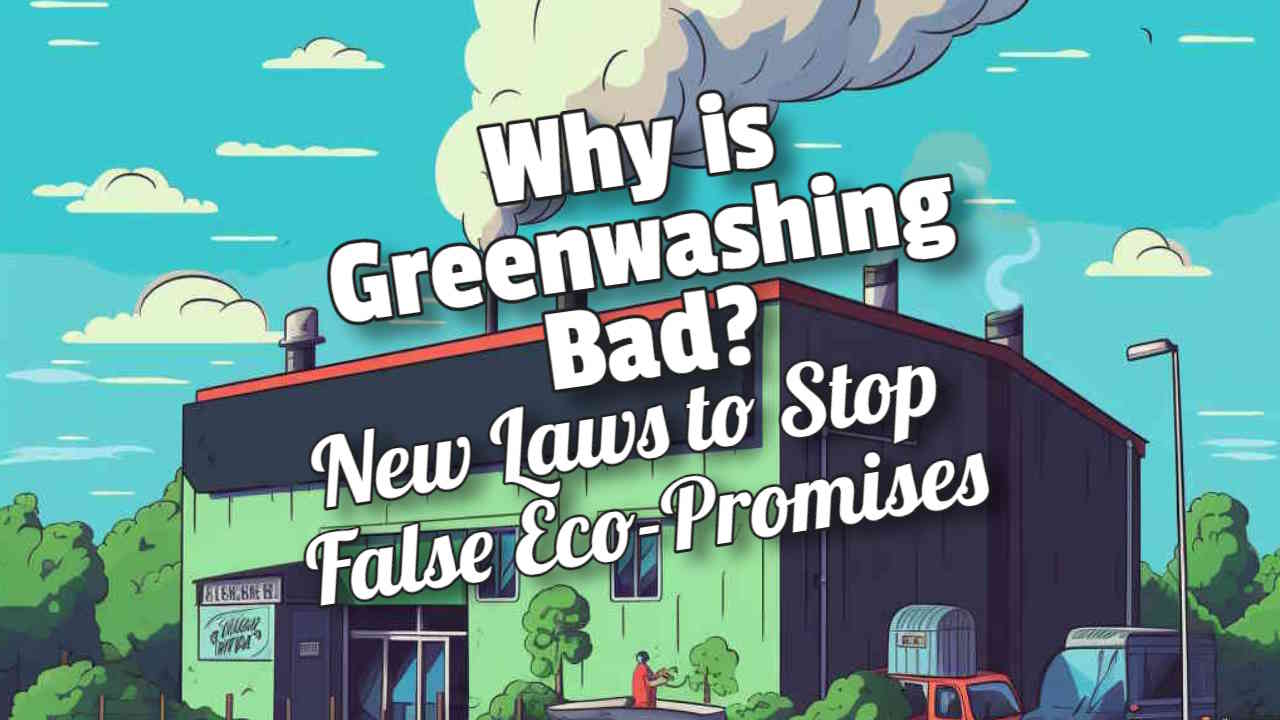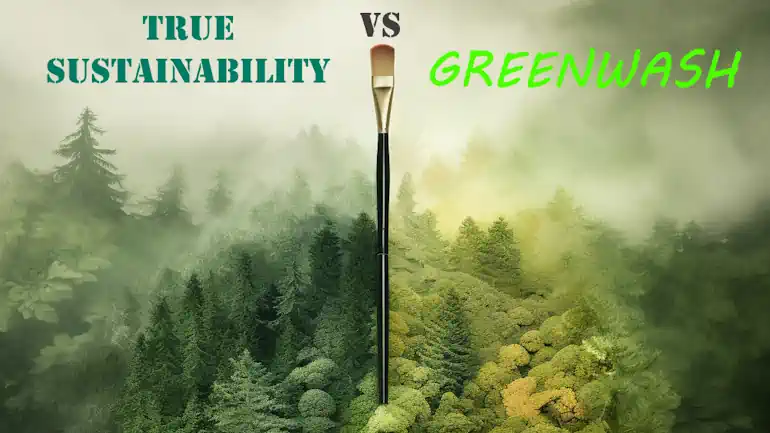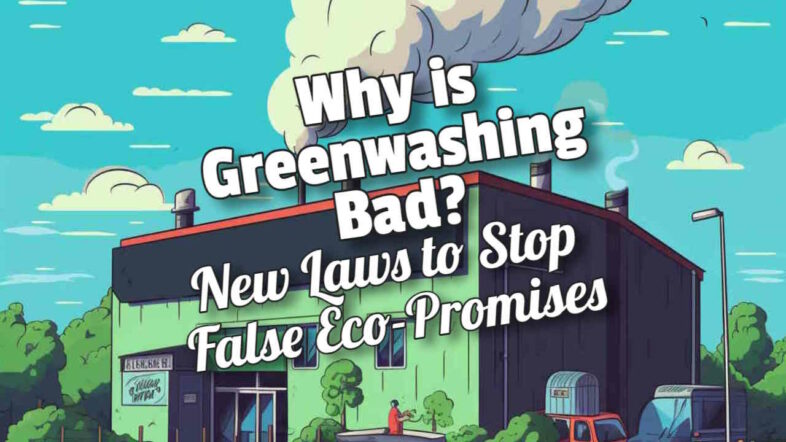Why is Greenwashing Bad? We explain this new threat, and how new anti-greenwashing laws and regulations are coming to Europe and the UK which will benefit genuinely sustainable companies that minimise their use of resources, minimise their waste output and recycle.
Introduction: Demystifying Greenwashing
In the age of climate consciousness, greenwashing has emerged as a contentious topic in the corporate world.
As consumers increasingly prioritize eco-friendly choices, many companies have turned to seemingly environmentally-friendly marketing tactics. Whether or not a lot of the current crop of green business marketing claims are being made knowingly to be deceptive, matters not. They need to stop before the public turns away and stops listening.
So, what's the real story behind the green facade, and why is greenwashing really so bad? This comprehensive guide delves into the depths of greenwashing, highlighting its dangers and exploring the steps towards a more authentic green future.
Part I: Why Is Greenwashing Bad?
What Exactly Is Greenwashing?
Greenwashing refers to the deceptive use of marketing to portray a company's products, activities, or policies as more environmentally friendly than they genuinely are. The term merges ‘green' (representing the environment) and ‘whitewashing' (to cover up or gloss over undesirable details).
It is not enough for companies to declare net zero targets, they must be backed up by carbon emissions reduction and sustainability action plans and based on rigorous costings which show them to be affordable before they are believable.

The Pervasiveness of False Claims
- Misrepresentation: Many companies boast of eco-friendly measures that are minimal or irrelevant, like highlighting a minuscule recycled component in an otherwise environmentally harmful product.
- Dilution of Genuine Efforts: Companies genuinely investing in sustainable practices may get overshadowed by the noise of false claims, hampering their potential market impact.
- Misdirection of Investment by the Waste Industry which is gearing up for the projected increased demand for recycling.
The Social Implications
– Misleading the Consumer: A significant harm of greenwashing is misleading well-intentioned consumers who wish to support genuine eco-friendly businesses.
– Eroding Public Trust: When consumers repeatedly encounter false claims, scepticism grows, and public trust in “green” initiatives diminishes.
Economic Repercussions
Greenwashing isn’t just an ethical concern; it has economic implications. Consumers may end up paying premiums for falsely labelled eco-friendly products. Meanwhile, genuinely green companies may face stiffer competition and lost revenues to less-deserving rivals.
Part II: How Widespread Is Greenwashing?
Disturbing Trends and Statistics
- Recent research revealed that 42% of green claims in the UK during 2022 were exaggerated, false, or deceptive. Source: EEB
- Of the 230 eco-labels in the EU, almost half were identified as having weak or absent verification procedures.
| Claims | Reality |
|---|---|
| Eco-friendly packaging | Only 20% might be recyclable, while the rest goes to landfills |
| Carbon-neutral companies | They may be buying carbon credits without making real changes to their operations |
There have been a number of recent regulatory and judicial rulings that suggest a crackdown on corporate greenwashing is imminent.
Only to Promise What Will Truly be Done
Limits on firms' capacity to make promises they have no intention of honouring are heralded by a study published last year by the United Nations High-Level Expert Group on Net-Zero Emissions Commitments.
Exaggeration Must Stop!
Ads that make exaggerated promises about a product's carbon neutrality are illegal under new rules in countries like France and the United Kingdom.
The UK's Advertising Standards Authority commissioned a study showing that when people hear such a promise, they automatically think that emissions have been cut down completely.
Offsetting Doesn't Really Impress Most People
Companies are cautioned by the ASA's revised standards against making claims of carbon neutrality if the emissions linked with the promoted product were only offset.
The French climate law, originally enacted in 2021 and revised in 2018, even goes further.
Carbon Neutrality Must be from Cradle to Grave
Carbon neutrality requires that all emissions associated with the product's production, use, and disposal are zero.
Avoidance, reduction, and offsetting (in that sequence) of emissions must be reported by businesses. They must also provide evidence that the offsets are quantifiable, observable, irreversible, and supplementary adding to existing commitments (i.e. no double counting!).
Companies who mislead their customers could be fined as much as $110,000 USD.
Part III: Regulations and Policies Countering Greenwashing
The EU’s Bold Step: The Green Claims Directive
The European Commission's proposal promises to set a precedent for global markets, emphasizing:
– Clear guidelines for environmental messaging.
– Strict rules for companies to substantiate their green claims.
The UK’s Initiative Against Greenwashing
The impending UK bill equips the Competition and Markets Authority with greater power to target and penalize misleading environmental claims, safeguarding both consumers and businesses.
How Regulations Benefit Truly Sustainable Companies
– Restoring Consumer Trust: With authentic claims taking centre stage, consumers can invest in truly green products with confidence.
– Promoting Real Innovation: Genuine sustainability will become a unique selling proposition, pushing companies to innovate beyond mere marketing tactics. (See https://carbontargeting.com )
Part IV: The Bright Future for Genuine Green Companies
The Recycling Industry as a Case Study
Companies like The Furniture Recycling Group exemplify genuine sustainability. The waste management industry, with its focus on repurposing and waste reduction, stands to gain significantly from anti-greenwashing regulations.
Rewards Await Authentic Players
– Market Recognition: As deceptive claims are curbed, authentic businesses can shine, winning customer loyalty.
– Incentives and Subsidies: Governments and institutions might offer perks to genuinely sustainable companies, further promoting authentic practices.
Strengthening the Business Ecosystem
When genuine green initiatives are recognized and rewarded, a positive feedback loop is created.
As more businesses see the tangible benefits of genuine sustainability, the entire business ecosystem shifts towards true eco-friendliness.

Moving Beyond the Green Facade
The battle against greenwashing is essential for a sustainable future. Understanding why greenwashing is bad provides us with the impetus to demand more from businesses. With informed consumers and stringent regulations, we can usher in an era where green isn't just a marketing gimmick but a way of life.
Part V: Key Drivers Behind the Rise of Greenwashing
Consumer Demand for Sustainable Products
In the era of eco-consciousness, consumers are gravitating towards brands that align with their values. With more than 66% of global consumers willing to pay more for sustainable products, there’s a green gold rush that many companies want to tap into.
Competitive Pressures
In saturated markets, brands are constantly seeking ways to differentiate themselves. Riding the green wave has become a popular strategy. However, instead of committing to genuine eco-friendly practices, some opt for the easier route of green-tinted marketing.
Lack of Clear Guidelines
In many industries, especially before the introduction of regulations like the Green Claims Directive, there were no standardized metrics or definitions for what constituted “green” or “sustainable.” This ambiguity allowed for more room to make vague or inflated claims.
Part VI: Unpacking the Impact of Misleading Green Claims
Environmental Consequences
When companies claim to be environmentally responsible but don’t act accordingly, it delays real action. This can lead to continued resource depletion, increased pollution, prolonged global warming carbon emissions, and a slower transition to renewable energy sources.
Economic Impact on Genuinely Green Businesses
When consumers become disillusioned by false claims, they may become sceptical of all green claims, even authentic ones. This hinders the growth of truly sustainable businesses and stifles innovation in green technologies.
Part VII: How to Recognize and Combat Greenwashing
Scrutinizing Claims
– Verify Certifications: Check for reputable third-party certifications or endorsements that validate a product's environmental claims.
– Research the Company: A company's broader practices can give context to specific product claims. Does the company have a history of environmental stewardship, or is this a new and isolated claim?
Support Transparent Brands
Brands that disclose their manufacturing processes, and supply chains, and give detailed information about their sustainability initiatives are often more trustworthy. Seek those that value transparency and responsibility.
Part VIII: Envisioning the Road Ahead
The Convergence of Ethics and Profit
More companies are realizing that genuine sustainability is not just ethically right but also profitable in the long run. With a consumer base that's increasingly informed and discerning, authentic green practices must surely soon become the norm rather than the exception.
Empowering Consumers
With more accessible information, regulatory support, and a collective push towards authenticity, consumers will be better equipped to make informed decisions. This power will drive the market towards genuine green solutions.
Charting a Truly Green Future
As the narrative shifts from “Why is greenwashing bad” to “How can we promote authentic sustainability,” it's evident that the future holds promise.
Regulatory measures, coupled with informed consumer choices, can purge the market of deceptive green claims. In this evolving landscape, genuine eco-friendly businesses will not only survive but thrive, leading the charge towards a sustainable future.
Part IX: The Ripple Effects of Greenwashing on Global Markets
Stifled Innovation in Green Technologies
Greenwashing creates a market where superficial changes can be more profitable than genuine innovation. Companies might opt for cheap, superficial “green” solutions rather than investing in revolutionary, sustainable technologies that might be initially more costly but offer long-term benefits.
Reputational Risks for Brands
Brands caught in the act of greenwashing face significant reputational damage. This negative publicity can have a long-term impact on a company's sales, stock prices, and overall public perception.
Part X: A Closer Look at the Green Claims Directive and Its Implications
The Mechanisms Behind Verification
The Green Claims Directive, as introduced by the European Commission, seeks to standardize the verification process for green claims. Key points include:
– Third-Party Assessments: Companies will need to have their claims vetted by reputable external agencies.
– Standardized Definitions: The directive will provide clearer definitions for terms like “carbon-neutral” or “sustainable,” reducing the grey area for interpretations.
Projected Outcomes for Genuine Green Companies
– Leveling the Playing Field: True eco-warriors in the business realm will no longer compete against misleading claims, allowing them to stand out more prominently.
– Increased Trust and Brand Loyalty: Companies that can authentically substantiate their claims will earn greater trust and loyalty from their consumer base.
Part XI: Key Takeaways for Businesses and Consumers
For Businesses:
– Invest in Authentic Sustainability: It's more than just a trend; it’s a growing consumer demand and a long-term investment.
– Transparency is Key: In the digital age, consumers are just a click away from verifying your claims. Be open, be honest, and avoid the pitfalls of greenwashing.
For Consumers:
– Stay Informed: Familiarize yourself with common greenwashing tactics and learn to discern genuine claims from misleading ones.
– Reward Authentic Green Efforts: Vote with your wallet. Support businesses that are making genuine efforts toward sustainability.
Part XII: Future Projections and the Evolution of the Green Movement
Shift Towards Circular Economies
As the conversation deepens around “why is greenwashing bad,” there's a parallel shift towards circular economies, where resources are reused and recycled, reducing waste and conserving energy.
Integration of AI and Big Data in Verification Processes
The future might see more integration of artificial intelligence and big data in verifying and monitoring green claims, making the process faster, more efficient, and more transparent.
Increasing Global Collaborations
To combat the global issue of greenwashing, we might see more international collaborations, setting standardized benchmarks, and sharing best practices to promote genuine sustainability across borders.
Conclusion: Towards a Greener Tomorrow
In conclusion, as we delve deeper into understanding “why is greenwashing bad,” we must remember the immense potential for change that lies ahead. Regulatory frameworks, combined with the power of informed consumers and genuine green businesses, can usher in a new era of authentic sustainability. The path forward is green, and it's up to us all to walk it responsibly.
FAQs: Understanding Why Greenwashing is Bad
1. What exactly is greenwashing?
Greenwashing refers to the practice where companies exaggerate or falsely claim their products or services to be environmentally friendly. It's a deceptive marketing strategy to attract eco-conscious consumers without making genuine efforts towards sustainability.
2. Why is greenwashing considered bad?
Greenwashing misleads consumers, making them believe they are making eco-friendly choices when, in reality, they might not be. This deceit harms genuine sustainable companies by creating unfair competition and slows down the progress of genuine environmental initiatives. Essentially, greenwashing erodes trust and hinders the green movement.
3. How can I spot greenwashing?
Look for vague claims without evidence, such as “eco-friendly” or “green” without any certifications or details. Be wary of products that emphasize one minor green attribute but neglect other significant environmental impacts. Research and staying informed are crucial.
4. How does greenwashing affect the market and genuine green businesses?
Greenwashing creates an uneven playing field. Genuine green businesses, which might have higher operational costs due to authentic sustainable practices, face unfair competition from companies that merely pretend to be green. Consumers might end up supporting the latter, thinking they are making an eco-friendly choice.
5. How are governments and organizations addressing greenwashing?
Many governments are introducing stringent regulations, like the EU’s Green Claims Directive, to clamp down on false environmental claims. Organizations are also setting standardized benchmarks and pushing for transparent third-party verifications to authenticate green claims.
6. Why is there a rise in greenwashing in recent years?
With the growing awareness and concern for environmental issues, consumers are increasingly inclined towards green products and services. Companies recognize this trend and some opt for deceptive marketing strategies to tap into this consumer sentiment without making genuine green efforts.
7. Are there any penalties for companies caught greenwashing?
Yes, depending on the jurisdiction. Many governments are imposing fines and other penalties on companies that make misleading environmental claims. For example, the proposed Green Claims Directive aims to impose fines on companies caught greenwashing in the EU.
8. How can I support genuine green businesses?
Research and educate yourself about the companies and products you support. Look for third-party certifications, read product labels thoroughly, and ask companies direct questions about their sustainability efforts. Voting with your wallet and supporting authentic green businesses can drive change in the market.
9. Is greenwashing only related to environmental claims?
While the term “greenwashing” is primarily associated with misleading environmental claims, the concept can be extended to any instance where companies exaggerate or falsely claim positive attributes without substantiation. This could include areas like social responsibility, ethical sourcing, etc.
10. How can I stay informed and avoid falling for greenwashed products?
Stay updated with information from reputable environmental organizations, look out for standardized eco-labels, and always question and verify claims before making a purchase. Engaging with and joining green communities can also help in sharing knowledge and best practices.
Conclusion
Understanding “why is greenwashing bad” empowers consumers to make informed decisions and pushes the market towards genuine sustainability. By asking questions, staying informed, and supporting genuine green initiatives, we can combat the greenwashing trend and move towards a truly sustainable future.







